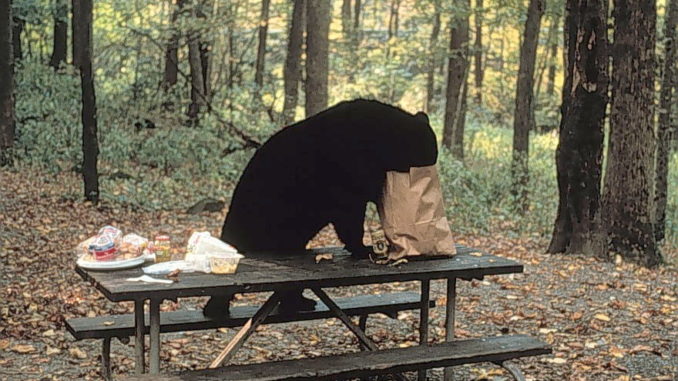
RALEIGH, N.C. – Examine any urban black bear sighting in North Carolina, and you’re likely to find two common denominators: easily available food and a loss of the animals’ natural habitat.
Black bear sightings are on the rise in the Tar Heel state, as human development eats away at the wild places they used to call home.
“The tremendous amount of residential development in bear habitat and the increasing bear population in western North Carolina has resulted in more encounters between bears and humans,” said Mike Carraway, a wildlife biologist for the N.C. Wildlife Resources Commission. “Almost all of the encounters have involved some type of food source that humans provided for the bears either intentionally or unintentionally. Most bear problems can be resolved by simply removing the food sources.”
Virtually every housing development in the western part of the state was built upon pre-existing bear habitat – places where they used to eat, sleep and breed. For a black bear, a birdfeeder is like a new drive-through restaurant. The same goes for a bowl of pet food or unprotected trash left outside. Factor in a bear’s keen sense of smell and strong memory, and it’s understandable how they wind up scavenging residential communities.
Because bears are usually afraid of humans and prefer not to waste energy, removing the food source will likely to stop them from dropping by.
Most residential developments in bear habitat do not allow hunting, resulting in small bear sanctuaries. Bears that have not been subjected to hunting or have become accustomed to humans because of intentional feeding are often the ones that show up in residential areas. This poses problems for both the communities and the bears, which are likely to be killed by motor vehicles or nervous neighbors.
If you live in an area with bear activity, remove potential food sources like birdfeeders and pet food. If you can not place trash receptacles inside, purchase bear-proof containers for storing your garbage.
The NC Wildlife Resources Commission has a policy against trapping and relocating bears because this generally does not solve the problem but merely transfers it to a new area where the bear will find other food sources to raid. Because some male bears have a home base of 20,000 acres, a residential community or commercial trash dumpster is almost always nearby regardless of where the animal is relocated. In addition, if the food source is not removed, other bears will be attracted to the area. The long-term answer is not tranquilizing and trapping the bears, but educating the public about what attracts these animals and what they can do to prevent encounters.
As we expand into areas once strictly the domain of bears and other wild animals, precautionary steps must be taken. A good beginning is to remove potential food sources and eliminate the bear’s primary reason for showing up in the first place.



Be the first to comment